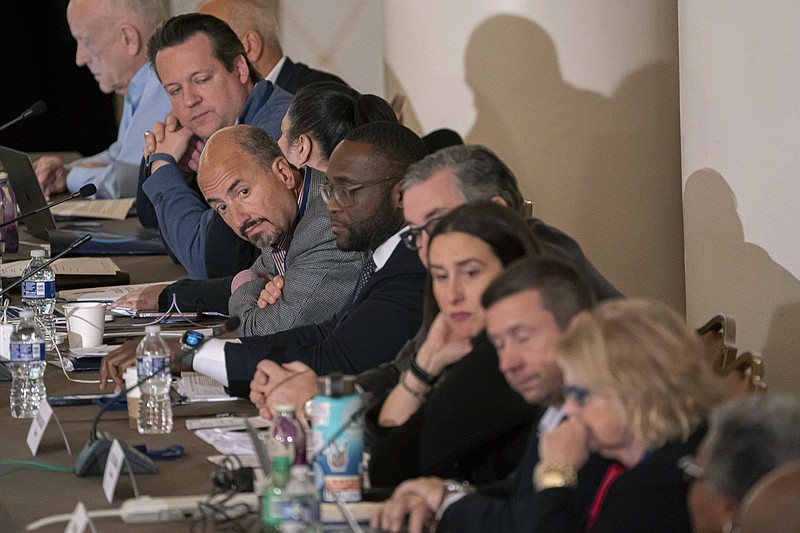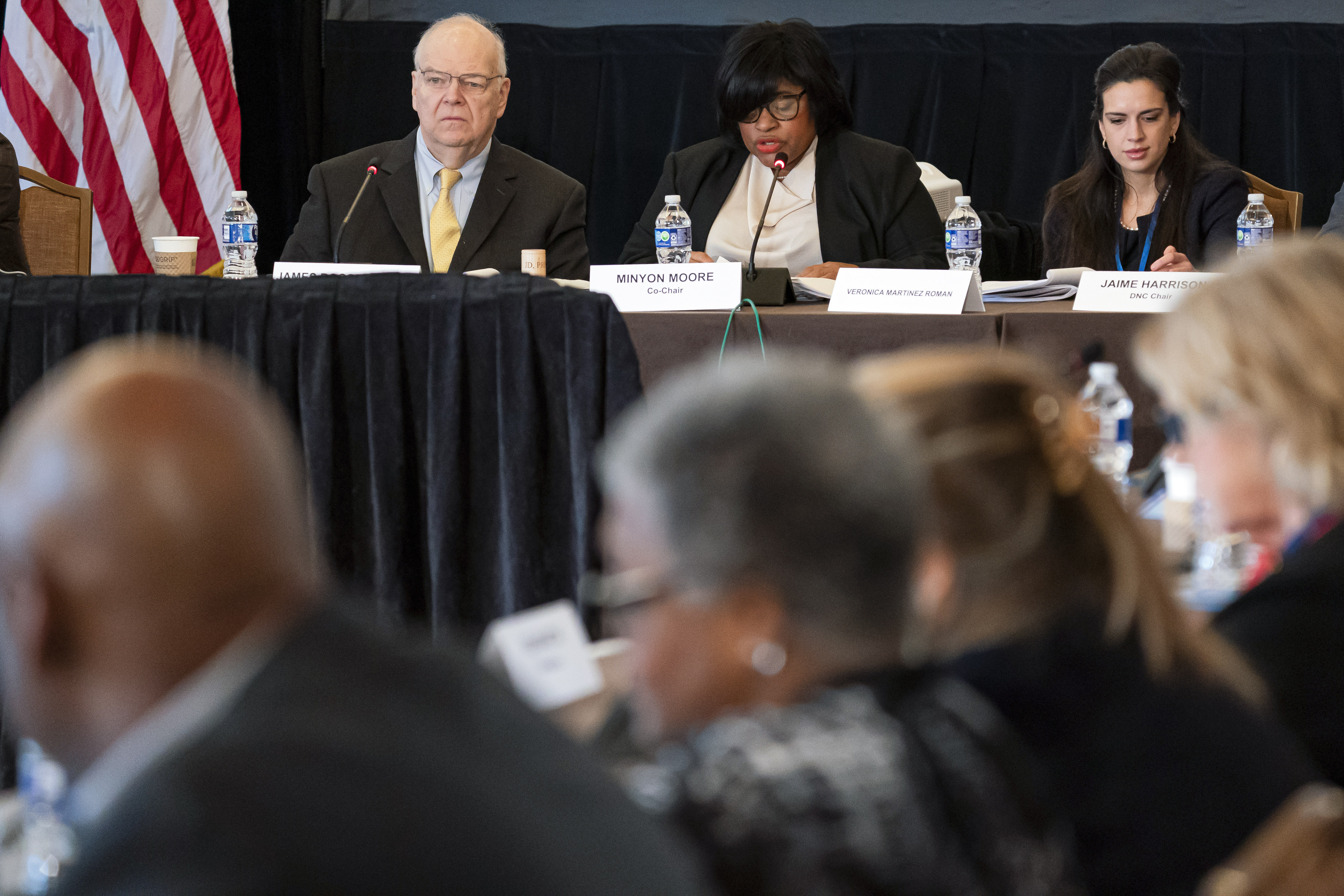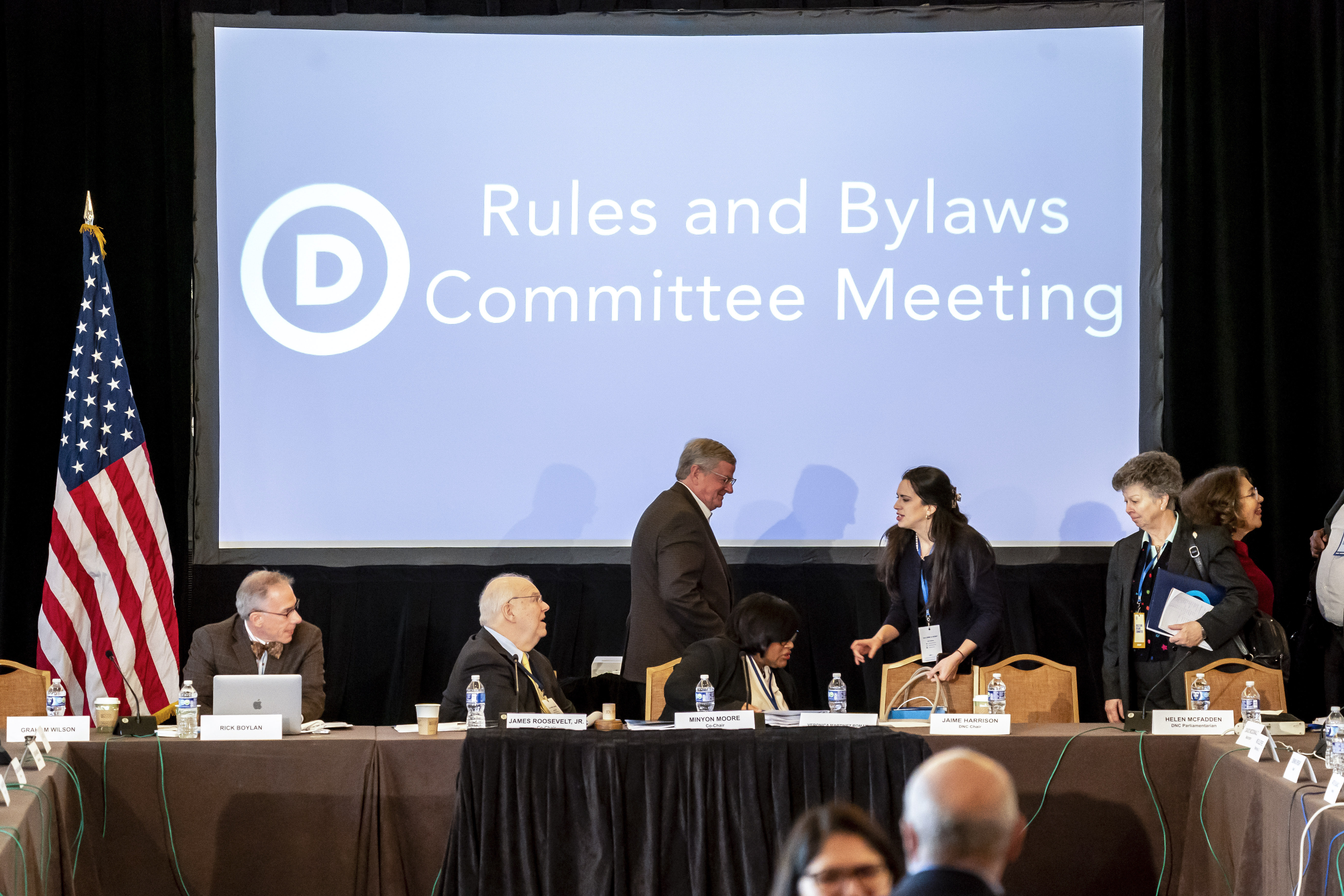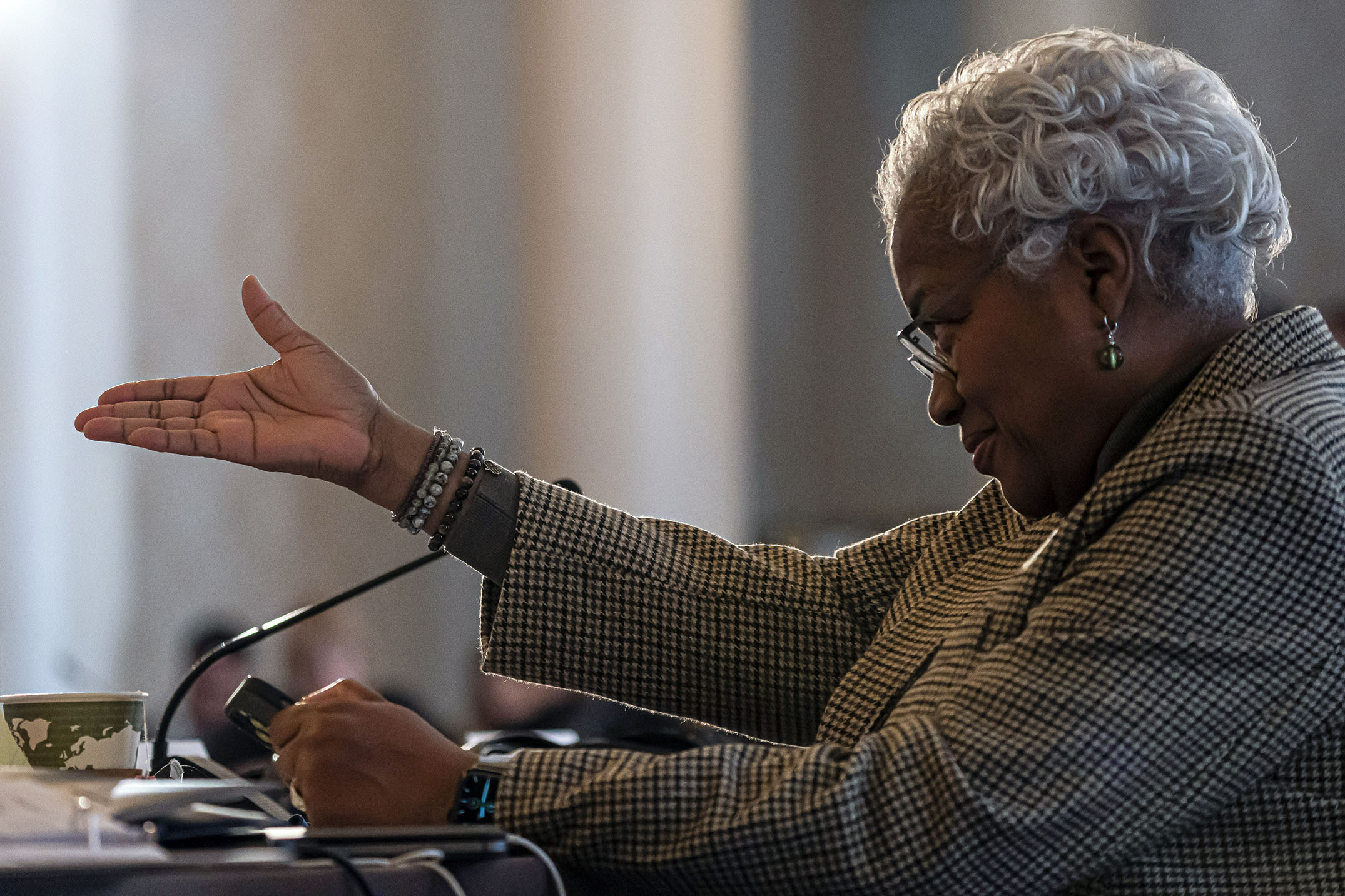WASHINGTON -- Democrats voted Friday to remove Iowa as the leadoff state on the presidential nominating calendar and replace it with South Carolina starting in 2024, a shake-up championed by President Joe Biden to better reflect the party's deeply diverse electorate.
The Democratic National Committee's rule-making arm made the move to strip Iowa from the position it has held for 50 years after technical meltdowns sparked chaos and marred results of the state's 2020 caucus. The change also comes after a long push by some of the party's top leaders to start choosing a president in states that are less white, especially given the importance of Black voters as Democrats' most loyal electoral base.
Discussion on prioritizing diversity drew such impassioned reaction at the committee gathering in Washington that DNC chair Jaime Harrison wiped away tears as committee member Donna Brazile suggested that Democrats had spent years failing to fight for Black voters: "Do you know what it's like to live on a dirt road? Do you know what it's like to try to find running water that is clean?"
"Do you know what it's like to wait and see if the storm is going to pass you by and your roof is still intact?" Brazile asked. "That's what this is about."
The committee approved moving South Carolina's primary to Feb. 3 and having Nevada and New Hampshire vote three days later. Georgia would go the following week and Michigan two weeks after that.
The move marks a dramatic shift from the current calendar, which has had Iowa holding the first-in-the-nation caucuses since 1972, followed by New Hampshire's first-in-the-nation primary since 1920. Nevada and South Carolina have gone next since the 2008 presidential election, when Democrats last did a major overhaul of their primary calendar.
Under the rules adopted Friday, South Carolina would vote Feb. 3, 2024, followed by a joint primary Feb. 6 in New Hampshire and Nevada. The Georgia primary would be Feb. 13 and the Michigan primary would be Feb. 27.
The rest of the country would be free to set primaries between March 5 and June 4, 2024. Some state legislatures set primary dates; others have their secretaries of state or the directors of their state parties do it.
The chosen states were given until Jan. 5 to demonstrate that they can hold their primary contests on their assigned dates or risk losing their positions in the calendar. The calendar is not expected to be adopted by all the affected states, likely forcing further revisions next year before the full Democratic National Committee ratifies the schedule.
The revamped schedule could largely be moot for 2024 if Biden opts to seek a second term, but may remake Democratic presidential cycles after that. The president has said for months that he intends to run again, and White House aides have begun making staffing discussions for his likely reelection campaign, even though no final decision has been made.
The party should scrap "restrictive" caucuses altogether because their rules on in-person participation can sometimes exclude working-class and other voters, Biden wrote Thursday in a letter to rules committee members. He also told party leaders privately that he'd like to see South Carolina go first to better ensure that voters of color aren't marginalized as Democrats choose a presidential nominee.
The DNC also plans to revisit the primary calendar again before 2028 -- meaning more changes could be coming before then.
Biden said the new calendar would only apply to the 2024 cycle and should be reconsidered after the next presidential election.
"I got into politics because of civil rights and the possibility to change our imperfect union into something better," Biden wrote. "For fifty years, the first month of our presidential nominating process has been a treasured part of our democratic process, but it is time to update the process for the 21st century."
Four of the five states now poised to start the party's primary are presidential battlegrounds, meaning the eventual Democratic winner would be able to lay groundwork in important general election locales. That's especially true for Michigan and Georgia, which both voted for Donald Trump in 2016 before flipping to Biden in 2020. The exception is South Carolina, which hasn't gone Democratic in a presidential race since 1976.
EARLIER BALLOTING
The first five voting states would be positioned to cast ballots before Super Tuesday, the day when much of the rest of the country holds primaries. That gives the early states outsize influence since White House hopefuls struggling to raise money or gain political traction often drop out before visiting much of the rest of the country.
As the meeting began Friday morning, some members of the Rules and Bylaws Committee voiced support for the Biden plan. Stuart Appelbaum of New York called the Biden rubric "an elegant plan."
"This is what our party looks like. This is what America looks like," he said.
"I support what the president of the United States has asked us to do," said another committee member, Randi Weingarten, the president of the American Federation of Teachers.
House Majority Whip Jim Clyburn, South Carolina's lone congressional Democrat and one of Biden's top supporters in Congress, said the president called him Thursday to inform him of his push to move his state up.
"I didn't ask to be first," Clyburn said. "It was his idea to be first."
Clyburn's endorsement of Biden in 2020 boosted the candidate's flagging presidential campaign just ahead of South Carolina's primary, which he won big. That helped Biden shake off early losses in Iowa, New Hampshire and Nevada and eventually take the White House.
"He knows what South Carolina did for him and he's demonstrated that time and time again by giving respect to South Carolina," Clyburn said.
Nevada, with its heavily Hispanic population, initially balked at sharing the second-place slot with New Hampshire, a state 2,500 miles away. Nevada committee member Artie Blanco's voice cracked as she argued against the change.
"If we want to build a strong relationship with Latinos," Blanco said, "then Nevada must stand alone on a date and not have to share that date."
After more discussion, Blanco said later that she would support the new calendar. It was "not ideal" for her state to go the same day as another, she said, but "we accept what the will of the president is."
NOT WITHOUT PUSHBACK
Still, the vote by the rules committee has faced serious pushback, with some states vowing to ignore the changes altogether. That's despite the panel approving language saying that statescould lose all of their delegates to the party's national convention if they attempt to violate new rules.
Candidates who campaign for primaries or caucuses that are not sanctioned -- or place their names on ballots in those contests -- can also be punished by the national party, with any delegates they win in those states being stripped of voting power at the convention. Rogue candidates could also be stripped of access to the party-sanctioned debate stages.
Only committee members from Iowa and New Hampshire objected to the proposal that passed Friday, with everyone else supporting it.
"One of the things that New Hampshire is known for is our retail politics, and candidates having the opportunity to engage the electorate face-to-face," said Joanne Dowdell, a DNC member from New Hampshire. "By having three states, one on top of the other, I think causes a little bit of conflict for candidates trying to vie for the attention, get name recognition and also raise money."
Laws in their states mandate them going before others, Iowa and New Hampshire, and they intend to abide by those, not DNC decrees.
The chair of the Iowa Democratic Party noted in a statement that the country's longtime leadoff caucus state has a law that "requires us to hold a caucus before the last Tuesday in February and before any other contest." The decision to pursue the latter would be up to the state central committee and elected officials, said Scott Brennan, a member of the rules committee from Iowa.
"Small, rural states" like Iowa "must have a voice in the presidential nominating process," Brennan said.
"Democrats cannot forget about entire groups of voters in the heart of the Midwest without doing significant damage to the party in newer generations," he said.
The Republican National Committee has already decided to keep Iowa's caucus as the first contest in its 2024 presidential primary, ensuring that GOP White House hopefuls -- which include Trump -- have continued to frequently campaign there. The committee is expected to seek a split primary date in Michigan.
Republican willingness, or lack thereof, to change dates may also be relevant in several states, including in Republican-controlled Georgia.
The state's Deputy Secretary of State Jordan Fuchs did not clarify Friday how Republican Secretary of State Brad Raffensperger would handle conflicting delegate selection rules from the Democratic and Republican parties.
"Our legal team has continuously stated that both parties are going to be on the same day and we will not cost anyone any delegates," Fuchs said in a statement.
The DNC chair choked up after the vote as he talked about South Carolina once having been the site of the first attack of the Civil War and now being in line to lead off his party's primary.
"This proposal reflects the best of our party as a whole, and it will continue to make our party and our country stronger," Harrison said.
Information for this article was contributed by Will Weissert and Meg Kinnard of The Associated Press, by Michael Scherer and Tyler Pager of The Washington Post and by Katie Glueck of The New York Times.
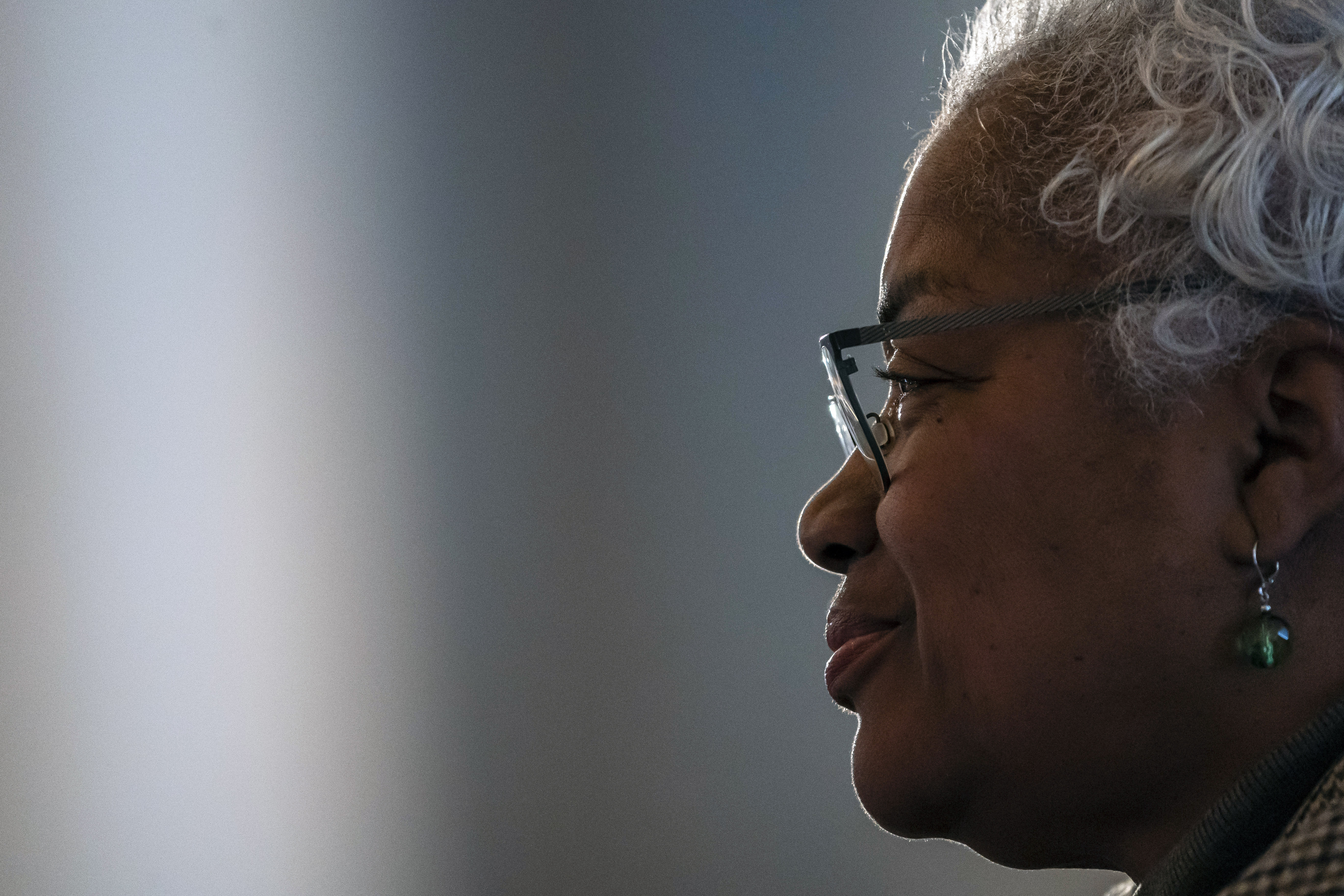 Committee member Donna Brazile speaks in favor of proposed changes to the primary system during a Democratic National Committee Rules and Bylaws Committee meeting to discuss President Joe Biden's presidential primary lineup at the Omni Shoreham Hotel on Friday, Dec. 2, 2022, in Washington. (AP Photo/Nathan Howard)
Committee member Donna Brazile speaks in favor of proposed changes to the primary system during a Democratic National Committee Rules and Bylaws Committee meeting to discuss President Joe Biden's presidential primary lineup at the Omni Shoreham Hotel on Friday, Dec. 2, 2022, in Washington. (AP Photo/Nathan Howard)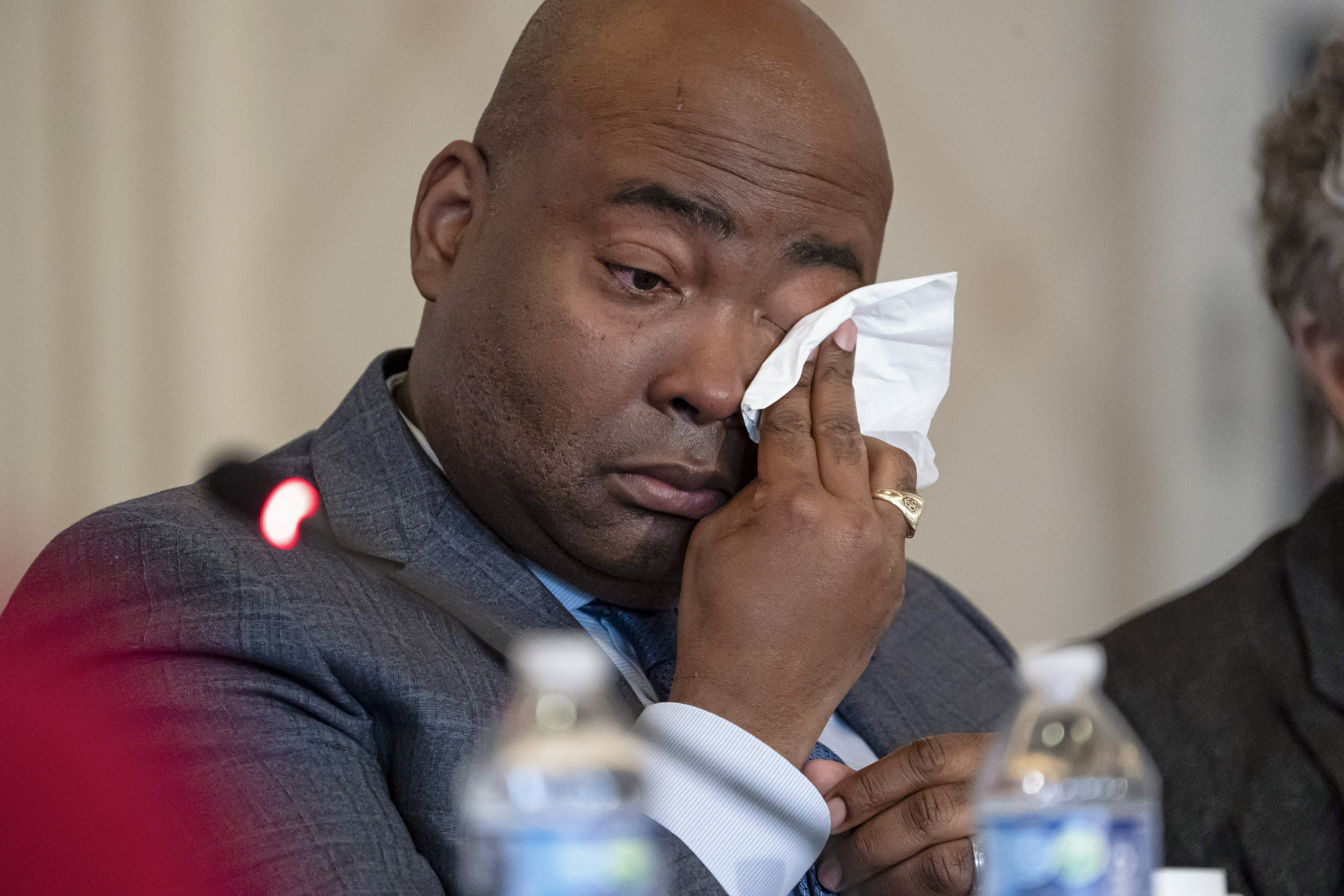 Democratic National Committee chair Jaime Harrison cries while listening to committee member Donna Brazile talk about the importance of proposed changes to the primary system during a DNC Rules and Bylaws Committee meeting to discuss President Joe Biden's presidential primary lineup at the Omni Shoreham Hotel on Friday, Dec. 2, 2022, in Washington. (AP Photo/Nathan Howard)
Democratic National Committee chair Jaime Harrison cries while listening to committee member Donna Brazile talk about the importance of proposed changes to the primary system during a DNC Rules and Bylaws Committee meeting to discuss President Joe Biden's presidential primary lineup at the Omni Shoreham Hotel on Friday, Dec. 2, 2022, in Washington. (AP Photo/Nathan Howard)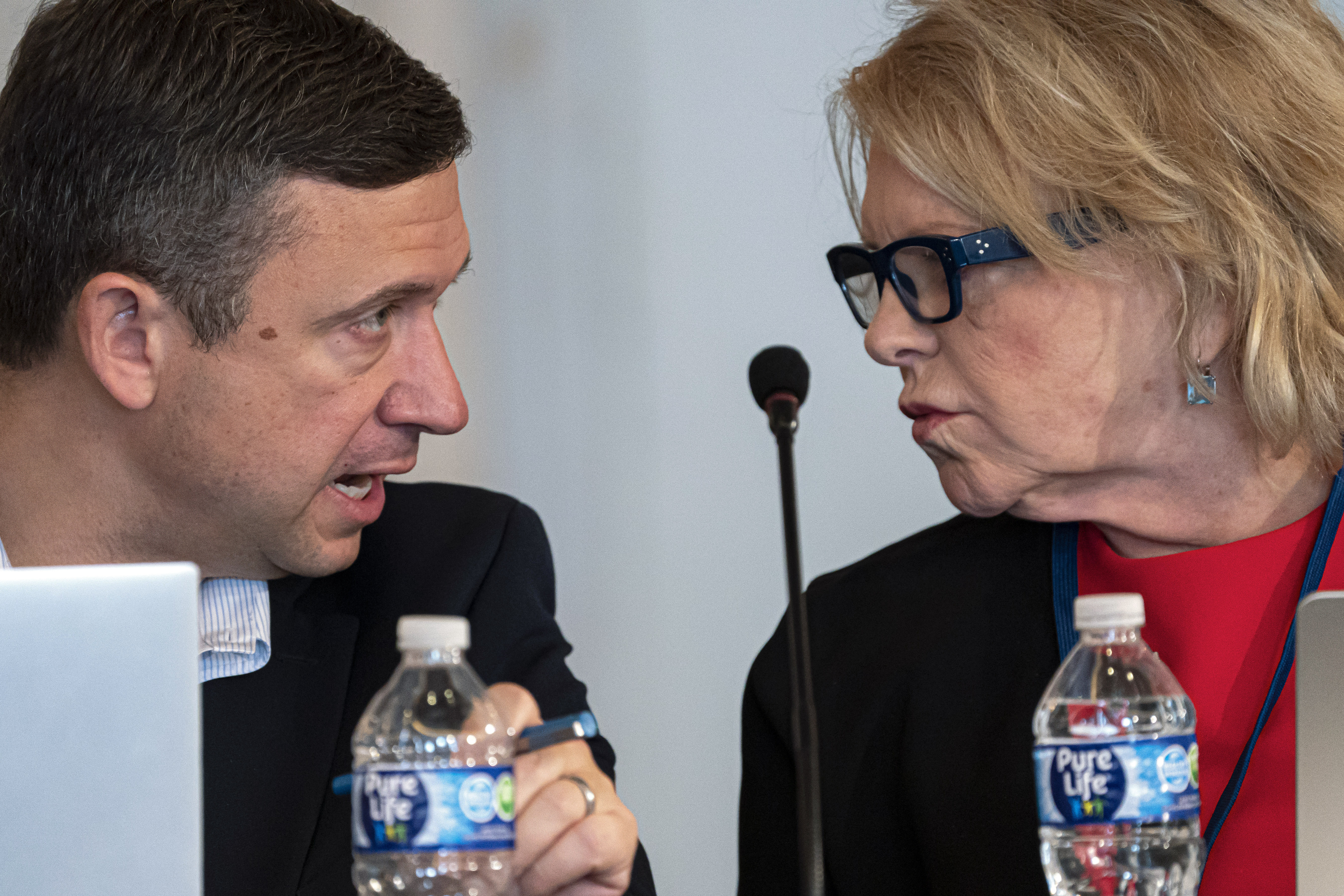 Committee members Ken Martin, of Minnesota, left, and Susan Swecker, of Virginia, talk during a Democratic National Committee Rules and Bylaws Committee meeting to discuss President Joe Biden's presidential primary lineup at the Omni Shoreham Hotel on Friday, Dec. 2, 2022, in Washington. (AP Photo/Nathan Howard)
Committee members Ken Martin, of Minnesota, left, and Susan Swecker, of Virginia, talk during a Democratic National Committee Rules and Bylaws Committee meeting to discuss President Joe Biden's presidential primary lineup at the Omni Shoreham Hotel on Friday, Dec. 2, 2022, in Washington. (AP Photo/Nathan Howard)